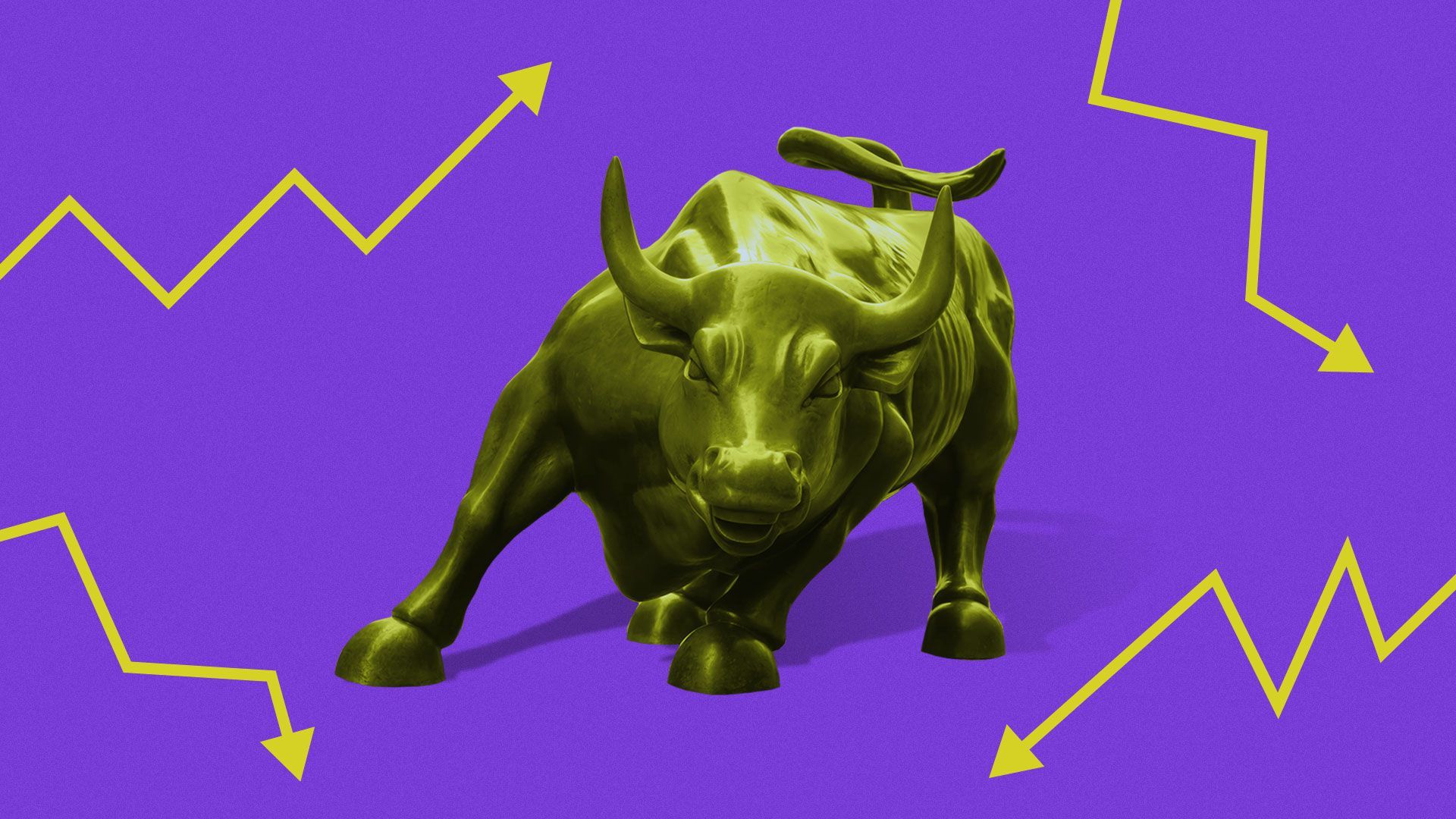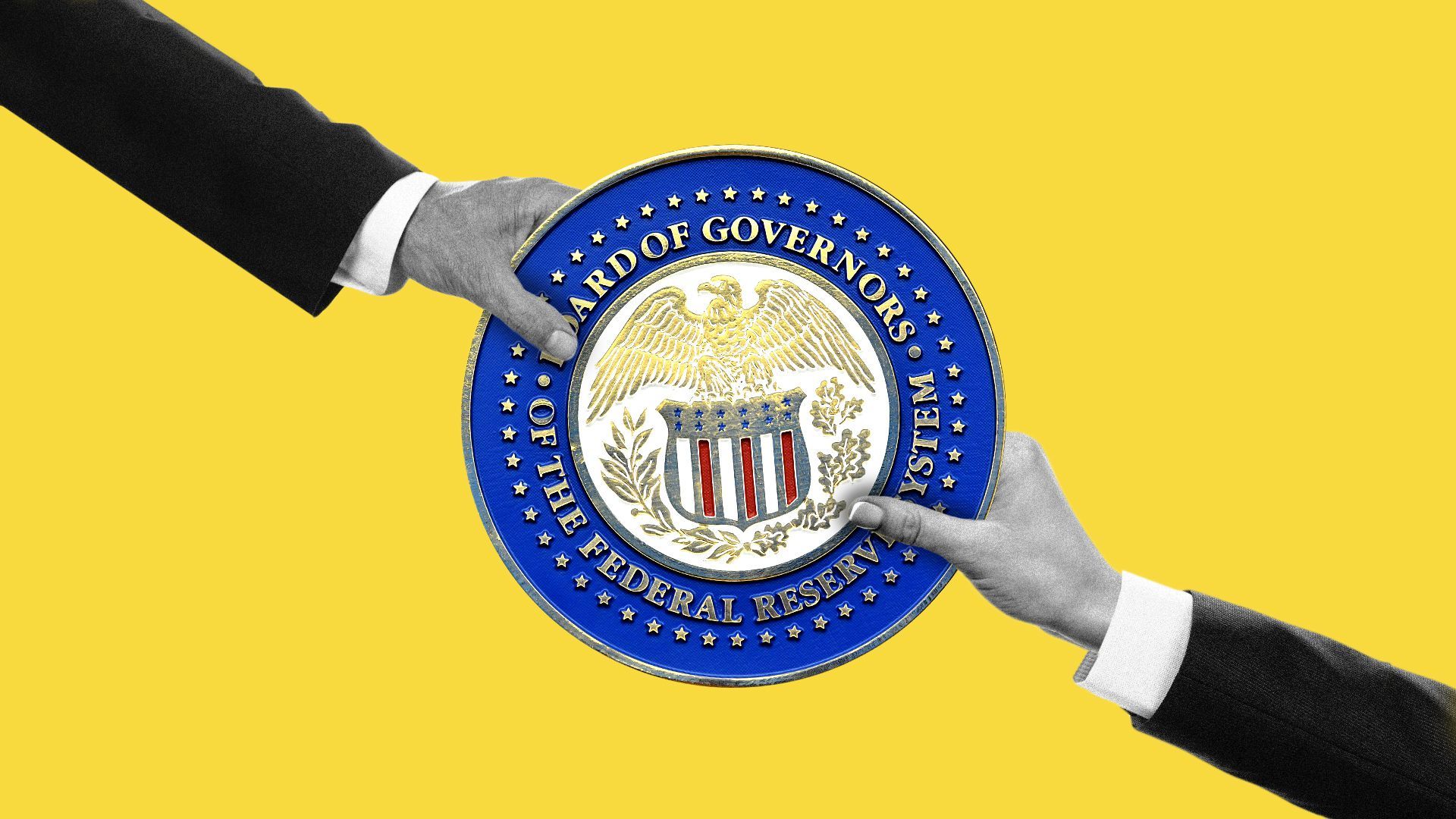| |
| |
| |
| Presented By Raytheon Technologies |
| |
| Axios Markets |
| By Courtenay Brown ·Nov 25, 2020 |
| Good morning. If this newsletter was forwarded to you, sign up here. (Today's Smart Brevity count: 1,193 words, a 4½-minute read.) 🦃 Axios Markets is taking a breather for the Thanksgiving holiday. We'll be back in your inbox on Monday. 🗣 "Maybe it's wiser to surrender before the miraculous scope of human generosity and to just keep saying thank you, forever and sincerely." - See who said it below. |
| |
| |
| 1 big thing: Wall Street bets it all on a vaccine |
 |
|
| Illustration: Eniola Odetunde/Axios |
| |
| It's the time of year when Wall Street shops are rolling out predictions for where they see the stock market headed in the coming year. - There's one common theme: Widespread distribution of a vaccine is the reason to be bullish.
Why it matters: Analysts say vaccines will help the economy heal, corporate profits rebound and stock market continue its upward trajectory. What they're saying: "Despite investor focus on the prospective policy implications of the Biden presidency, the vaccine for COVID-19 is a more important determinant of the path of both the economy and stock market in 2021," David Kostin, chief U.S. equity strategist at Goldman Sachs, said in the firm's 2021 outlook. - Kostin expects at least one vaccine will be FDA approved and administered to a large swath of the U.S. population next year.
- UBS — which sees the S&P 500 rising as much as 11% higher from Wednesday's closing price by the end of next year — expects a vaccine will be widely available by the second quarter next year.
- "That should help put Europe and the U.S. on the path to a sustained recovery," the firm's analysts note. "If we are right, we expect corporate earnings to rebound quickly."
Between the lines: The markets' path "will likely be down and then up," before jumping 6% by the end of next year, according to Bank of America's forecast released Tuesday. - Analysts there note "the recovery is intact and the world likely re-opens" in the second half of the year.
Yes, but: A lot of optimism is already priced in from the vaccine and expected economic recovery. - And there are several risks that Wall Street is watching, such as a muddled vaccine rollout alongside a virus resurgence and longer economic lockdowns.
- Plus, there could be a further delay in additional fiscal stimulus.
What they're saying: "Even with recent positive vaccine and treatment developments, the global pandemic and its unprecedented impact is unlikely to fade in coming months," says Brian Belski, chief investment strategist at BMO Capital Markets. - He's betting massive fiscal and monetary support will keep coming.
- BMO says the S&P 500 will end 2021 at 4,200 — a roughly 17% upside to Tuesday's closing price.
The one thing that's all but certain: accommodative Fed policy for the foreseeable future. (Chicago Fed chair Charles Evans said this week interest rates won't move higher until late 2023, at the earliest.) - More firms are betting the Fed will up the pace of bond buying or at least change up the mix of its purchases — particularly now that its emergency lending programs will lapse at the end of the year.
- The Fed could also utilize its new policy framework to anchor treasury yields, John Herrmann, rates strategist at MUFG, wrote in a client note on Tuesday.
|
    |
| |
| |
| Bonus chart: Where the forecasts stand |
 Data: Historical data from Yahoo Finance, select targets from Axios Research; Chart: Andrew Witherspoon/Axios |
    |
| |
| |
| 2. Catch up quick |
| J.Crew has a new CEO again: Madewell head Libby Wadle is the struggling retailer's third chief executive in three years. (Business Insider) Fraud watch: California paid out over $140 million in unemployment claims filed in the name of inmates. (WSJ) Purdue Pharma pleaded guilty to three criminal charges — admitting its role in the opioid crisis. (Axios) What does rap mogul Jay-Z and cannabis have in common? This SPAC. (Pitchbook) |
    |
| |
| |
| A message from Raytheon Technologies |
| The future of aerospace and defense is here |
| |
 |
| |
| At Raytheon Technologies, nearly 200,000 engineers, scientists and researchers are pushing the limits of known science to explore deep space, advance aviation and build smarter defense systems that protect all of us here at home. That's the future of aerospace and defense. Learn more at RTX.com |
| |
| |
| 3. Mnuchin's plan to shift unspent Fed funds |
 |
|
| Illustration: Aïda Amer/Axios |
| |
| A move by Treasury Secretary Steven Mnuchin could handcuff his likely successor Janet Yellen's ability to immediately restart Fed economic programs. Driving the news: Mnuchin is planning to shift $455 billion in unspent CARES Act funds into a special account that would require Congress' permission to access, Bloomberg reports. - It's the latest development in the battle over the Fed's emergency lending programs that Mnuchin said would sunset at year-end.
Why it matters: Assuming no deal before the inauguration, no one knows how long it will take to push through another stimulus when Joe Biden takes office. In theory, these funds could have backed Fed economic support programs while Congress hashes out the next aid package. - Now it looks like using these funds comes with the additional hurdle of congressional signoff.
The big question: Whether Mnuchin can do this. - Bharat Ramamurti, who's part of the watchdog panel overseeing CARES Act funds, tweeted Mnuchin's plans were "illegal and can be reversed next year."
- He's not the only one who believes transferring the money to this fund now violates terms laid out in the CARES Act.
- Treasury maintains Mnuchin's move is legal, Bloomberg notes.
|
    |
| |
| |
| 4. The Dow's road to 30K |
 Data: Yahoo Finance; Chart: Andrew Witherspoon/Axios It took 218 trading days for the Dow to hit the latest 1,000-point milestone. Why it matters: Dow 30K is a purely symbolic milestone. The Dow hitting 30,001, for instance, is no less significant. - It does underscore the stock market's meteoric rise since hitting its pandemic-low almost exactly 8 months ago, when it closed at 18,321. It's up 62% since then.
How we got here: The stock market defied a never-before-seen pandemic that's infected millions around the globe, killed hundreds of thousands of people in the U.S., and left the economy in shambles. - Fed & fiscal: Stocks have been turbocharged by central bank support and a massive stimulus package that's since dried up.
- Big Tech: A handful of tech companies — including Amazon and Apple — lead the bulk of the market rebound.
- Earnings: Corporate earnings in some cases are better than before the pandemic — though Q3 profits are still on pace for a year-over-year plunge.
- Gridlock: Wall Street cheered the prospect of a divided Congress.
- Vaccine: Interim trial results from a number of vaccines show a high rate of efficacy — and presented the prospect of a quicker return to normalcy.
The result has been near-total risk-on mode, making other assets like bonds less attractive in the eyes of some than stocks. The bottom line: "More significantly for investors, the broader market as measured by the S&P 500 also hit a record high," Bankrate chief financial analyst Greg McBride said in a note. "But '3635' just doesn't have the same ring to it." |
    |
| |
| |
| 5. SEC floats gig worker equity plan |
| Axios' Kia Kokalitcheva reports: The SEC proposed rule changes that would make it possible for gig companies to give equity to workers as part of their compensation if they meet certain requirements. Why it matters: This is something companies like Uber and Airbnb have asked the SEC to consider as a way to share their companies' upside with these non-employees. How it works: The five-year pilot program would allow gig companies to issue equity as long as it's no more than 15% of a worker's compensation during a 12-month period, and no more than $75,000 in value during a 36-month period (based on the share price when it's issued). - Individuals cannot negotiate whether they want equity or cash in exchange for their services.
- The company has to reasonably try to prevent gig workers from reselling the equity.
Between the lines: While the document doesn't mention home-sharing hosts (like those on Airbnb), it does specify that marketplaces for the permanent sale of real estate, "as opposed to the temporary rental of real estate," would not qualify. - Airbnb, which is in its pre-IPO quiet period, declined to comment.
|
    |
| |
| |
| 6. 🛒 Why a tame Black Friday might be here to stay |
| The pandemic will likely force the quietest Black Friday in our lifetimes. There may be fewer images of long lines and packed stores — but online sales are expected to soar. - It's possible the Black Friday as we knew it never returns.
What they're saying: "I think the digital trends that we've seen are here to stay. We probably would have made it to this kind of shopping trend anyway, but it might have taken a few years," Walmart U.S. CEO John Furner tells Dan Primack on "Axios Re:Cap." 🎧 Listen to the full episode. |
    |
| |
| |
| A message from Raytheon Technologies |
| The future of aerospace and defense is here |
| |
 |
| |
| At Raytheon Technologies, nearly 200,000 engineers, scientists and researchers are pushing the limits of known science to explore deep space, advance aviation and build smarter defense systems that protect all of us here at home. That's the future of aerospace and defense. Learn more at RTX.com |
| |
| Quote: "Maybe it's wiser to surrender before the miraculous scope of human generosity and to just keep saying thank you, forever and sincerely." Who said it: Elizabeth Gilbert, author of the bestselling book "Eat, Pray, Love." 🥧 Have a happy, safe Thanksgiving. I'm feeling über-thankful this year — and forever grateful for our Axios readers. See you back here on Monday. |







No comments:
Post a Comment